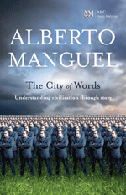 | Alberto Manguel THE CITY OF WORDS University of Queensland Press, 166 pp. Source: review copy Review by Michael Freedman |
It is a little difficult to know quite what to make of The City of Words. Based on a series of Massey lectures delivered by Alberto Manguel in 2007, The City of Words is an attempt, to paraphrase the obligatory blurb on the book's outside back cover, to demonstrate how the present world's ills can be solved by examining the visions of the past, visions that have emanated from the minds of the world's entertainers -- the "poets, novelists, essayists and filmmakers". Presumably, by including essayists in this list, Manguel is including himself.
The subject is fascinating, and had the potential to give birth to a work of extreme insight, but my expectations took a hit upon reading the book's introduction. In what is almost an apology to the reader, Manguel describes the thoughts that follow as "[l]ess a question than a series of questions, less an argument than a string of observations" and, even more worrying, a "confession of bewilderment". Bewilderment, unfortunately, will probably be the reader's primary emotion upon finishing Manguel's treatise.
Born in Argentina in 1948, Alberto Manguel is a man of many achievements and talents. He is an author, translator, editor, anthropologist, linguist, bibliophile -- and, above all else, a master storyteller. To embark on a review of a work that is the product of such a brilliant, erudite mind is somewhat daunting. In contributing to the Massey lectures, a week long series of lectures held annually in Canada, Manguel joins such esteemed company as Martin Luther King Jnr., John Kenneth Galbraith, Northrop Frye, and Noam Chomsky. And yet, after reading what is admittedly a superbly crafted series of ideas, the reader is still left in some doubt as to what conclusion Manguel is trying to reach.
The book itself comprises five essays, each of which draw upon famous pieces of literature to illustrate its relevance to contemporary society. Storytelling, as Manguel himself admits, comes very easy to him, and to give the man his due, he is nothing if not extremely well read. His use of metaphors is rich and vivid, and so are his ideas of the eternal nature of language. At one point, he opines that "language ... does not merely name but brings reality into being". And later: "words not only grant us reality, they can also defend it for us". With such a bold claim, Manguel is really on a hiding to nothing -- unless his essays also "bring reality into being", they risk being a disappointment.
Perhaps the main problem with Manguel's work is that while he knows exactly what he is trying to say, he is being too clever in how he goes about saying it. While The City of Words has much to teach us about how fantasy can assist in explaining reality, the underlying fear is that the lesson is not packaged in an accessible way. This is no doubt partly a by-product of the uncertain nature of the subject, but the greater frustration may come from Manguel's sometimes confusing delivery.
When Manguel's ideas do hit their mark, they can be thought-provoking and insightful. In his essay entitled "The Voice of Cassandra" Manguel explores parallels between the life of novelist Alfred Doblin, a Prussian Jew who fled Hitler's Germany in 1933 to escape the Nazi regime, the tragic experiences of Cassandra, the cursed visionary of Greek mythology, and the equally tragic tendency of contemporary leaders to refuse to learn from the past, ignoring the warnings of today's "visionaries". Too often, though, the reader (even after repeated readings) is unable to decipher Manguel's prose to unlock the insight contained within, and is left tired and weak from the effort.
